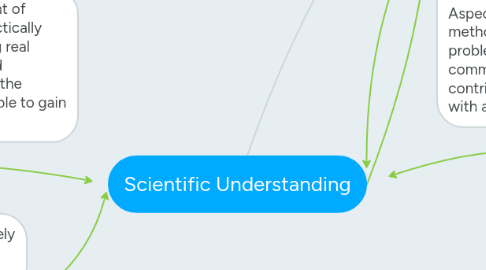Scientific Understanding
by Esme Wright

1. Alternative conceptions
2. Constructivist Teaching and Learning Approach
3. Analogies
4. Laboratory Work
5. Dialogic Discourse
6. Formative asssessment
7. involves class discussions, creating a sense of community within the classroom and can include problem solving, big-picture elaborations, hypothetical scenarios, or debates to challenge students’ (7)
8. Also known as misconceptions, students hold previous understandings of science concepts which may not be scientifically accurate.(2) These can be addressed and modified during discussions using
9. is an essential component of science study.(3) By practically exploring concepts using real examples, discussing and emphasising the aims of the activities, students are able to gain greater
10. understands that knowledge is created by the learner based on their experiences; they create meaning for the concepts and challenge their previous understandings.(4) This knowledge growth via change is catalysed by social interactions such as collaborative
11. assist students in understanding by relating the new information to something they already know about, and make a link to describe the concept.(1) This shows understanding and can be a form of
12. Is ongoing throughout the term, testing students and teachers progressively to spark change and progress, scaffolding for the final (5)
13. is a process by which teachers and students can receive feedback to reflect on their teaching strategies and assess their own learning for modifications if needed.(5) Activities can include the use of
14. These activities are seen as a process whereby the level of student understanding is addressed, whilst the teaching method and effectiveness are also tested.(5) This leads to teachers identifying
15. underpins the philosophy behind inquiry-based learning which can be explored by students via (3)
16. Can guide students collaboratively or individually to progressively determine (5)
17. National Curriculum
18. Summative Assessment
19. is developed via conceptual change, which is the result of cognitive modification of (2)
20. such as images, models, graphs, multimedia and role play assist in explaining concepts in a form other than or in conjunction with text. (6) These assist in addressing
21. Representations
22. and can be created by students to assess what has been learned as part of
23. relates to the accountability of the teacher and student, being a measure used to determine whether learning has occurred at the end of a learning sequence. (8) Forms of assessment in science should relate to learning outcomes listed in the
24. and should identify the achievement of
25. was created over 2009 and 2010 and includes Foundation – 10 and Senior (11-12) Biology, Chemistry, Physics and Earth and Environmental Science. (9) By understanding scientific foundations, students will be better able to make informed, evidence-based decisions and participate in international issues surrounding science as adults.(9) Aspects include the scientific method and inquiry processes, problem solving, science communication, applications and contributions to modern society, with an ultimate goal to support (9)
26. References 1 A.J. Jaeger, A.R. Taylor and J. Wiley, J. Ed. Psych., 108 (8) 1121-1139. 2 C.C. Tsai, Int. J. Sci. Educ., 25 (3) 307-327, DOI: 10.100.09500690210145756 3 J.W. Wilkinson and M. Ward, Aus. Sci. Teachers J., 43 (2) 49-58. 4 P.D. Egan and D. Kauchak, Educational psychology: windows on classrooms, Merrill and Prentice Hall, Upper Saddle River (NJ), 7th edn., 2007. 5 W.J. Popham, Transformative Assessment, Association for Supervision and Curriculum Development, Alexandria (VA) 2008. 6 M.A. Rau, V. Aleven and N. Rummel, J. Ed. Psych., 107 (1) 30-46. 7 S. Godhino, in Teaching making a difference, John Wiley & Sons, Milton (QLD), 2nd edn., 2013, part 3, pp. 250-289. 8 R. Killen, Programming and assessment for quality teaching and learning, Thomson Learning, Southbank (VIC), 2005. 9 Australian Curriculum, Assessment and Reporting Authority, Science – Foundation to Year 12, <http://www.acara.edu.au/curriculum/learning-areas-subjects/science>, 2016 (accessed 17 April 2017).


